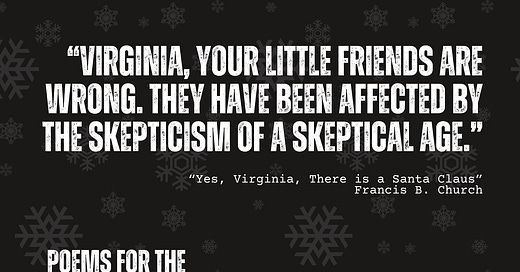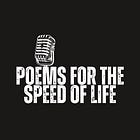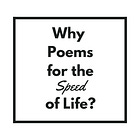S4, E6: "Yes, Virginia, There is a Santa Claus", by Francis P. Church
The sixth episode of the new series of Poems for the Speed of Life, on the theme of Christmas. "Yes, Virginia, There is a Santa Claus", by Francis P. Church
Welcome to another episode of Poems for the Speed of Life with Shane Breslin, entrepreneur, writer and poetry advocate.
This is the sixth episode of a new series of the podcast, poems on the theme of Christmas. Today’s piece is "Yes, Virginia, There is a Santa Claus", by Francis P. Church.
Commentary on “Yes, Virginia, There is a Santa Claus”, by Francis P. Church
When Virginia O'Hanlon wrote to the New York Sun with her most urgent, the question might have seemed unanswerable. We’ve probably all seen those old movies showing the insides of newspapers, journalists at the news desk, the editor in the small corner office, and you can imagine when this letter landed, that there might have been some of the consternation in their conversations.
How to answer a question like this?
How to prove something unprovable?
Francis Church took on the challenge, and in mentioning the essential nature of poetry — alongside faith, and romance — he managed to create something truly faithful to poetry itself, truly poetic and artful and everlasting.
For some context, the 1890s in New York was a time of remarkable change and contrast. The city was racing into modernity — electric lights were replacing gas lamps, automobiles were starting to appear on the streets, and as Church mentions, there was “a new skepticism” was in the air. It was the age of reason, of scientific progress, of believing that which you could see.
But believing what you could see creates a troubling after-effect: of needing to see to believe.
Church’s carefully calibrated response was about more than just Santa Claus — it was about what we lose when we find that we can only believe in what we can see and measure.
For a century or so after this, it was still common to hear the refrain that “children should be seen and not heard”, so it would have been easy for someone to talk down to Virginia. To bring a knowingness to the response, to treat Virginia, and all children, as something less than equal.
The great gift of Francis Church in his reply, though, is that he doesn’t do that, and he doesn’t just treat her as an equal, either. Instead, he elevates Virginia and her question into something absolutely universal. "All minds," he writes, "whether they be men's or children's, are little." In our vast universe, he suggests, we're all children trying to make sense of things beyond our understanding.
The work of Carl Jung and Sigmund Freud and all the advances in psychology and the workings of the mind that would come during the 20th were all many decades away when Church wrote his editorial, but he manages to capture a lot about mystery and wonder. When he writes that “the most real things in the world are those that neither children nor men can see”, he's talking about love, generosity, devotion, but also about mystery and beauty and joy and meaning, all things that will never be able to have a concise definition or perfect explanation, all invisible and intangible and still essential in all our lives.
That moment where he mentions tearing apart a baby's rattle to see what makes the noise? In many ways that’s a perfect image for what we sometimes do in life. We try to reduce everything to its mechanical parts, as if understanding how something works is the same as understanding what it means.
But Church suggests there's another way of knowing. "Only faith, poetry, love, romance," he writes, "can push aside that curtain and view and picture the supernal beauty and glory beyond."
What this piece so beautifully tells us is that in our rush to grow up, to be rational human beings, to see everything clearly, we run the risk of losing the ability to see beyond the visible or feel beyond the tangible. We run the risk of losing touch with the capacity for wonder that makes life rich and meaningful.
We must strike a balance between rationality and mystery. If we go too far on either side of that plank, we will topple over on our heads. The letter brings to mind that speech by John Keating, the English teacher in Dead Poets Society played by Robin Williams, who said:
“We don't read and write poetry because it's cute. We read and write poetry because we are members of the human race. And the human race is filled with passion. And medicine, law, business, engineering, these are noble pursuits and necessary to sustain life. But poetry, beauty, romance, love, these are what we stay alive for.”
When Francis Church writes that Santa Claus "lives and lives forever”, he’s talking about the same thing. About the way wonder and joy and mystery and generosity and love occupy an incalculable part of us, and a place in our human hearts that when it dies, we die.
Perhaps this short newspaper piece, now almost 130 years old — which, like Santa Claus, shows the signs of living and living forever — can help us all to reconnect with that part of ourselves that knows some of the most real things in the universe can’t be proven, but can only be lived, experienced, felt.
Thank you again for being here.
I’ll be back soon with another poem in this series, the Christmas series, where I am trying to introduce you the listener, wherever you are in the world, to some of the writers who have masterly managed to capture things that are almost impossible to capture, the feelings of goodness and peace and love that this time of year brings to our families and our friendships and our hearts and our minds.
See you next time on Poems for the Speed of Life.
The Christmas Series
This is a poem from the Christmas poems series of Poems for the Speed of Life.
I know there are listeners and followers of this podcast all over the world. I know that there are many people here with many different religions, and many different faiths — or none — and I know that Christianity is just one.
If a series about Christmas leaves you in any way cold or distant, let me say that the goal of this series of the podcast is not to evangelize about Christianity, nor to show the benefits of one way of being or thinking or believing at the expense of all the others.
What it is, though, is my attempt to create something that captures something of the goodness of this time of year.
Because when I think of Christmas, and when I put aside all the dogmas of us-versus-them religion, and when I put aside the mass consumerism of the so-called “shopping season”, and when I really think of this time of year, of these few weeks each December, what I think, and what I feel, is captured in one or two words.
Goodness. Love.
When you’re about on the streets at this time of year — and yes, I’m probably talking about Europe, or the Americas, or the other places that might be part of so-called “Western Civilization” or the “Western Hemisphere” — there is something always good in the air. It is something that contains magic.
It is communal. It is generous. It is kind.
It is goodness.
It is love.
And maybe — for who am I to have any certainty about what is and what isn’t? — maybe it is God’s love, maybe it is the love of Christ, that comes to us and through us at this time of year.
Whatever it is, it is a love and a goodness that never — not in my experience anyway — comes fully through the giving or receiving of gifts, but arrives in the space between. In a quiet moment. In the look in a loved one’s eye or some fleeting moment on the street or at work, when something passes unsaid, something that remains unsaid because we might not have the words to say it, but is still somehow completely understood.
And so, this series of the podcast will include poems, and some other pieces of writing, that touch on this. Poems and passages of writing that actually do find the words that capture some of that wonder and magic. Some of that invisible spirit.
Some of that goodness. And some of that love.
Long-time listeners will know that I sometimes broaden my definition of what a poem is to include in Poems for the Speed of Life.
Sometimes I offer song lyrics, as in “The Best Day of My Life” by Tom Odell in Episode 30, “The West Coast of Clare” by Andy Irvine in Episode 45, and “The Living Years” by Mike Rutherford, in Episode 2 of the recent Fatherhood poems series.
I will do that again in this series, with a song written by an Irishman who said he has written dozens of — in his words — “dreadful maudlin songs”, but that this one came to him from somewhere else, some other place, some unseen but always present source of creativity.
Sometimes I offer sections of prose that, to me, carry all the power of poetry, like “Desiderata” by Max Ehrmann in Episode 165 and a passage from Vaclav Havel’s “Hope” in Episode 187.
In this series I will include, again, the long prose poem by Dylan Thomas titled “A Child’s Christmas in Wales” and the series will also feature a segment from “A Christmas Carol” by Charles Dickens, which, no matter how good and how memorable all the various movie adaptations might be, stands above them all as a peerless work of writing. I aim to read both Dickens and Thomas every December in any case, and here I will read them for you.
I will read a newspaper editorial published in the 1890s, and I will also, of course, read poems — by an English poet laureate, by a late great Irish poet, by several Americans, dead and alive, and by others, from elsewhere around the world.
This series is for everyone.
It’s for everyone who might want or need to feel some of this goodness and some of this love, especially in our world which sometimes seems like it’s in short supply of both.
It will be for everyone who wants to give generously, and not just in material or monetary ways, but in the generosity of spirit and consciousness and goodwill that will always be useful, and cherished, by the people you come into contact with.
I look forward to bringing you the new series of Poems for the Speed of Life, on Christmas, starting with Episode 1, on Saturday, November 23rd and continuing through December 2024.
Thank you for listening. If you’re not already subscribing or following, please do so, for free, in your podcast app or in Spotify. Keep an eye on your podcasts feeds, and you’ll be hearing from me again very soon.
See you soon.
For a detailed outline of the mission and purpose behind this podcast, please check out these two episodes:
If you’re on social media, you can follow on Instagram here and Facebook here.
You can subscribe to or follow the show for free wherever you listen to podcasts.
To leave the show a review:
On Spotify. Open the Spotify app (iOS or Android), find the show and tap to rate five-stars.
On Apple. Open your Apple Podcasts app, find the show and tap to rate five-stars.
On Podchaser. Open the Podchaser website, find the show and tap to rate five-stars.








